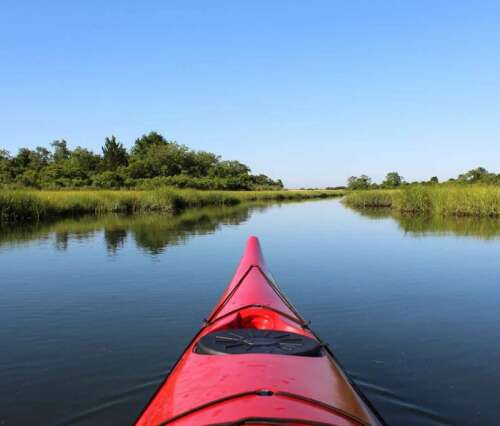
Outdoor enthusiasts in southeastern Connecticut are fortunate to be surrounded by an abundance of natural grandeur.
A secluded canal flows between the Poquonnock River and Bluff Point Coastal Reserve in Groton. (Photo by Steve Fagin)
We can hike through “a mosaic of tidal marshes, woodlands, grasslands, and pristine beaches” at Bluff Point Coastal Reserve in Groton, where “birdwatchers will be delighted to spot ospreys, herons, and even the occasional bald eagle soaring overhead, while the shoreline teems with marine life.”
At Harkness Memorial Park in Waterford, visitors can “stroll through the renowned Eolia Gardens, a meticulously landscaped masterpiece featuring colorful blooms, intricate topiaries, and serene reflecting pools. The scent of blooming roses fills the air in the Rose Garden, and the rhythmic sound of the waves crashing on the rocky shore provides a soothing soundtrack.”
For a more adventurous outing, head to 491-foot Lantern Hill in North Stonington: “From the moment you set foot on the trail, you’ll be immersed in a world of lush greenery, vibrant wildflowers, and the songs of birds hidden in the branches above. Climbing Lantern Hill is not just about reaching the summit; it’s about discovering the soul-soothing magic of this serene natural haven.”
Haley Farm State Park is a mecca for cross-country skiing: “As you glide along the trails, the world around you hushes into a peaceful silence, broken only by the occasional whisper of the wind through the trees. The crunch of snow beneath your skis becomes a soothing rhythm, and the winter landscape unfolds before your eyes.”
Meanwhile, kayakers will be hard-pressed to find a more rewarding destination than Fishers Island Sound: “For those seeking a truly magical experience, kayaking from Esker Point in Noank, CT, to the enchanting shores of Fishers Island, NY, is an expedition that promises breathtaking views, peaceful serenity, and a connection with the marine world that few activities can match.”
Don’t take it from me — I didn’t write these descriptions. In fact, nobody did. They were generated by ChatGPT, a computerized language-processing tool, developed by a company called OpenAI, that is driven by artificial intelligence. The name stands for Chat Generative Pre-trained Transformer.
In short, ChatGPT relies on a vast database of information derived from previously published articles, books, websites and other sources, to respond to requests for everything from scientific treatises to haiku.
Just for “fun” the other day, I logged in to a free program through the ChatGPT website and asked it to produce a series of columns about some of this region’s most popular outdoor destinations. I put quotation marks around “fun,” because it initially was amusing how insightfully, eloquently and instantaneously ChatGPT responded.
Less than a second after I typed the prompt, “Write a column about hiking at Bluff Point in Groton,” the following words began rolling across my desktop screen: “Nestled along the shores of Long Island Sound in Groton, Connecticut, lies a hidden gem that has managed to remain a well-kept secret among nature enthusiasts and locals for years…” Ten seconds later, the rest of the 580-word essay appeared. Amazing!
This gleeful novelty soon wore off, though, replaced by growing consternation. Who needs a human writer when a computer can crank out prose faster than the average person can read, without getting your boots muddy?
As I scrolled through the essays, though, I noticed a recurring sameness to the narratives. There was an awful lot of “tranquility,” “serenity” and “lushness” out there.
I admit, we humans often reuse favorite phrases, particularly when writing about similar topics. I remember, years ago, while working on The Day’s Copy Desk, one job involved writing headlines (called “overlines,” for so-called stand-alone photographs — pictures that didn’t accompany an article).
Often, these photos depicted a couple walking on a beach or horse grazing in a meadow, and rather than writing “Couple walks on beach” or “Horse grazes in meadow,” copy editors, sort of as an inside joke, took to using the same overline: “A quiet scene.”
Anyway, the managing editor eventually noticed this repetition and sent out a stern memo: NO MORE QUIET SCENES!
Years later, I told this story to a copy editor at The Day. The next day I opened the paper and saw a photo of the sun setting over a field. The overline: “A quiet scene.”
All right, word repetition is one thing — factual error is quite another. As I read through the ChatGPT-produced columns, I noticed quite a few glaring mistakes.
For instance, the column about Bluff Point erroneously notes, “The reserve allows for tent camping, offering a rare chance to fall asleep to the soothing sounds of the waves crashing on the shore and wake up to the songs of coastal birds.”
Nope. The park closes at sunset, and you’ll face trespassing charges if caught pitching a tent.
As for Lantern Hill, the computer-generated column incorrectly reports that the summit is marked by a stone fire tower — “an iconic landmark that adds a touch of history to your adventure, as it once served as a lookout during World War II.” Sorry, no such tower.
Regarding kayaking around Fishers Island, which I’ve written about one more than one occasion, there is no mention of treacherous tidal currents at The Race or through Wicopesset Passage. Whoops.
Of course, we humans make mistakes. Not long ago I errantly wrote about a 19th century factory on the Niantic River that supposedly processed flaxseed into cooking oil. Waterford town historian Robert Nye noted I was lucky not to have capsized while navigating through history: Flaxseed was processed into linseed oil, for paints, not cooking, he correctly pointed out.
Good thing I didn’t try to sauté onions with linseed oil.
Other troubling aspects of AI-driven content refer to an issue that recently has been the subject of litigation and labor strikes: The fact that the program collects and offers for republication copyrighted material without attribution, permission or compensation.
A lawsuit filed this month by best-selling authors, including Michael Connelly, John Grisham and Jonathan Franzen, accuses ChatGPT of copyright infringement by unlawfully “training” its artificial-intelligence based chatbot to produce “new” fiction, based on their works.
Hollywood writers also went on strike, in part, because of increased use of AI to produce scripts for TV shows and movies.
In addition, teachers and professors are facing new challenges, now having to determine if homework assignments and term papers were completed with original research, or simply generated by AI.
Edward Abbey didn’t rely on artificial intelligence to write, “Wilderness is not a luxury but a necessity of the human spirit, and as vital to our lives as water and good bread.” Likewise, Henry David Thoreau’s first-hand experiences inspired this advice: “Live in each season as it passes; breathe the air, drink the drink, taste the fruit, and resign yourself to the influence of the earth.”
No artificial shortcuts could lead to these insights.



